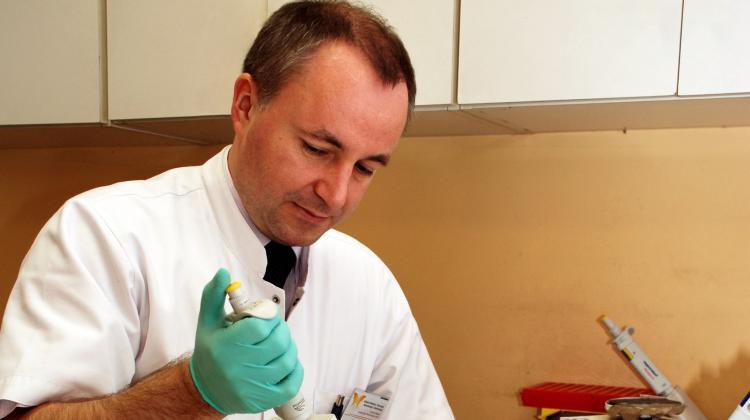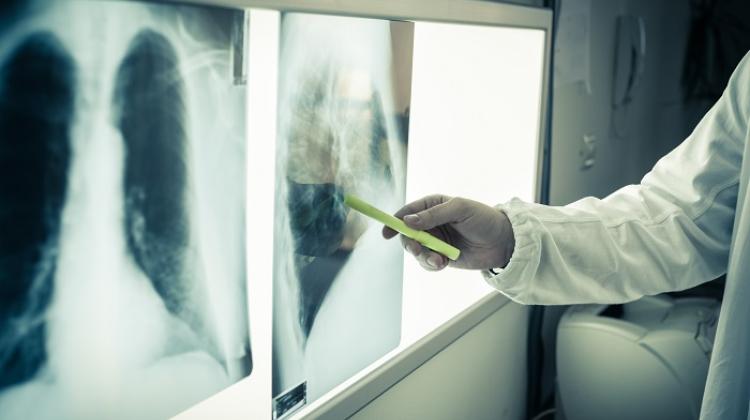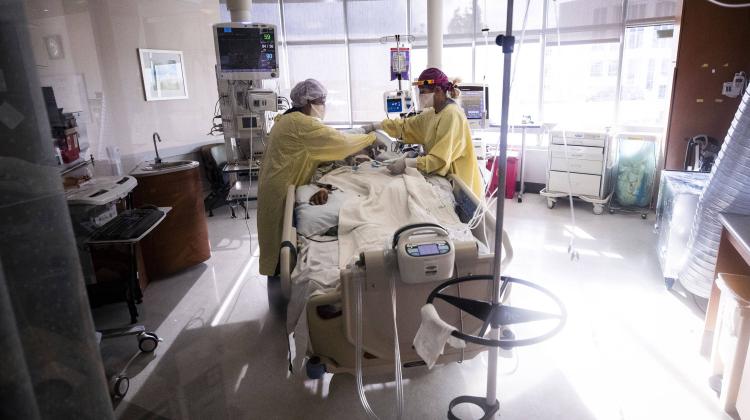Polish scientists plan to treat congenital immunodeficiency
 Prof. W. Młynarski. Photo: Grzegorz Krzyżewski
Prof. W. Młynarski. Photo: Grzegorz Krzyżewski
Scientists from three academic centres want to develop an innovative cell therapy that will allow to treat congenital immunodeficiency disorder called neutropenia. Due to neutropenia, approx. 3,000 children a year are unvaccinated in Poland. Effective diagnostics could change this.
Children born with congenital immunodeficiency are exposed to infections that threaten their lives. There is not enough neutrophils (one of the classes of white blood cells) in their blood. Neutropenia resulting from genetic defects is a serious disorder. Polish scientists believe that they will be able to offer an effective treatment.
Scientists from the Medical University of Lodz, the Jagiellonian University in Kraków and the Wrocław University of Science and Technology are working on creating effective diagnostic and therapeutic methods. They have obtained funding from the Foundation for Polish Science (FNP) in the TEAM-NET programme. The project is carried out under the supervision of Prof. Wojciech Młynarski from the Medical University of Lodz.
Diagnostics is an important challenge in this case. The experts emphasise that neutropenia may result not only from genetic defects, but also from immunological abnormalities. And the latter cause does not exclude vaccination. Currently, paediatricians can not distinguish between neutropenia resulting from genetic or immunological causes. In most cases, they decide not to administer vaccinations in any patient with neutropenia. Due to neutropenia, approx. 3,000 children do not receive vaccinations in Poland every year, which has a significant effect on the health of the entire population.
"Sometimes a child`s immune system is a bit dysfunctional and, after a viral infection, begins to produce antibodies the destroy neutrophils. A transient reduction in the number of white blood cells occurs. During that time, the risk of further infection increases, but these are rarely life-threatening infections. This type of neutropenia should not be a reason to postpone vaccination in children" - says Prof. Wojciech Młynarski.
His team intends to develop a simple and cheap test that will allow to distinguish between immunodeficiencies resulting from genetic causes and non-genetic ones.
"We also want to find new, undiscovered genes responsible for congenital neutropenia. Today, in about 30-40% of patients with congenital neutropenia we do not know the exact genetic cause responsible for this state of the gene. The third goal is to develop, and put into clinical use, a modern therapy for congenital neutropenia based on gene edition" - the professor explains.
Researchers will start by collecting bone marrow from patients with congenital neutropenia. They will isolate blood stem cells - precursors of all blood cells, including neutrophils. They will then repair the genetic errors found in stem cells in a lab. Healthy neutrophils will be cultured from repaired stem cells. After confirming that these neutrophils are functional, they will be administered to patients. Professor Młynarski suspects that this procedure will allow to cure congenital neutropenia.
"During this procedure, we will analyse the whole genome of individual cells to see if gene editing has negatively affected any fragment of the genome, in other words, whether we have not broken something while repairing neutrophils" - the scientist says.
According to the Foundation for Polish Science, the gene editing method can replace bone marrow transplantation that is currently used in similar situations. Allogeneic bone marrow transplants are expensive and carry a high health risk. But above all, it is very difficult to find the right material. Experts estimate that as many as 10-20 percent patients in need of a transplant will never find the right donor. The new method, based on gene editing, will be more accessible, a much smaller burden for the body, and probably much cheaper.
The research project "We will cure neutropenia (FIXNET)" received nearly PLN 23 million from the Foundation for Polish Science. This amount will allow to create of a consortium of five research teams working together to solve the problem of congenital neutropenia. The consortium will include doctors, geneticists, molecular biologists, cell biology specialists and chemists from three academic centres.
FIXNET is one of five projects that received funding in the TEAM-NET programme competition of the Foundation for Polish Science in March. The programme finances interdisciplinary scientific research carried out by a network of cooperating research teams led by accomplished, experienced scientists.
The objective of the TEAM-NET programme is to facilitate the implementation of large-scale interdisciplinary research in Poland, to intensify inter-regional cooperation between research units, and to develop competences related to utilising the available research infrastructure and research services. The TEAM-NET competition is organised by the Foundation for Polish Science and financed with funds from the and Smart Growth Operational Programme.
PAP - Science in Poland
kol/ ekr/ kap/
tr. RL
Przed dodaniem komentarza prosimy o zapoznanie z Regulaminem forum serwisu Nauka w Polsce.


















